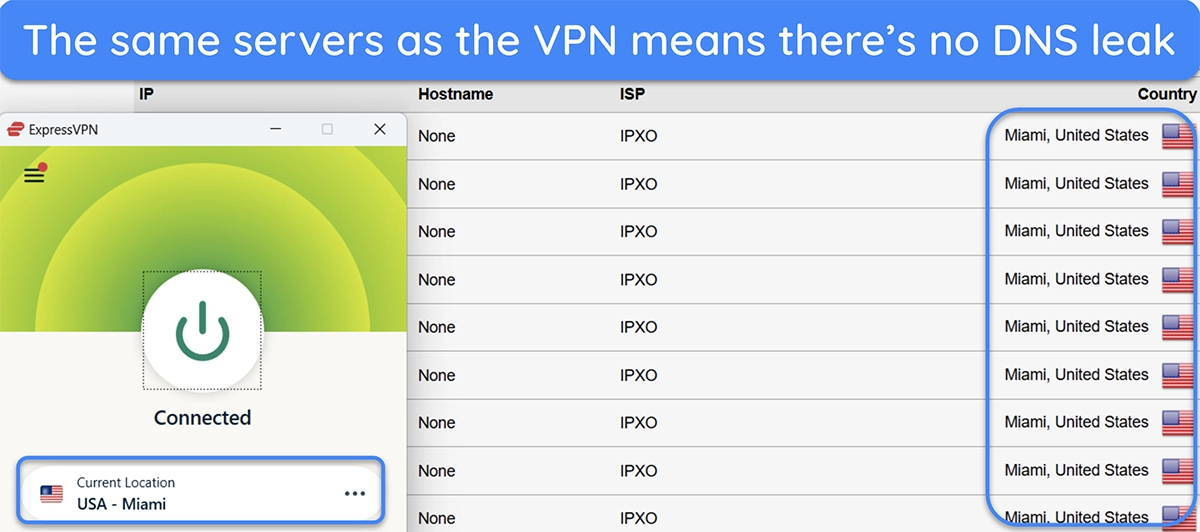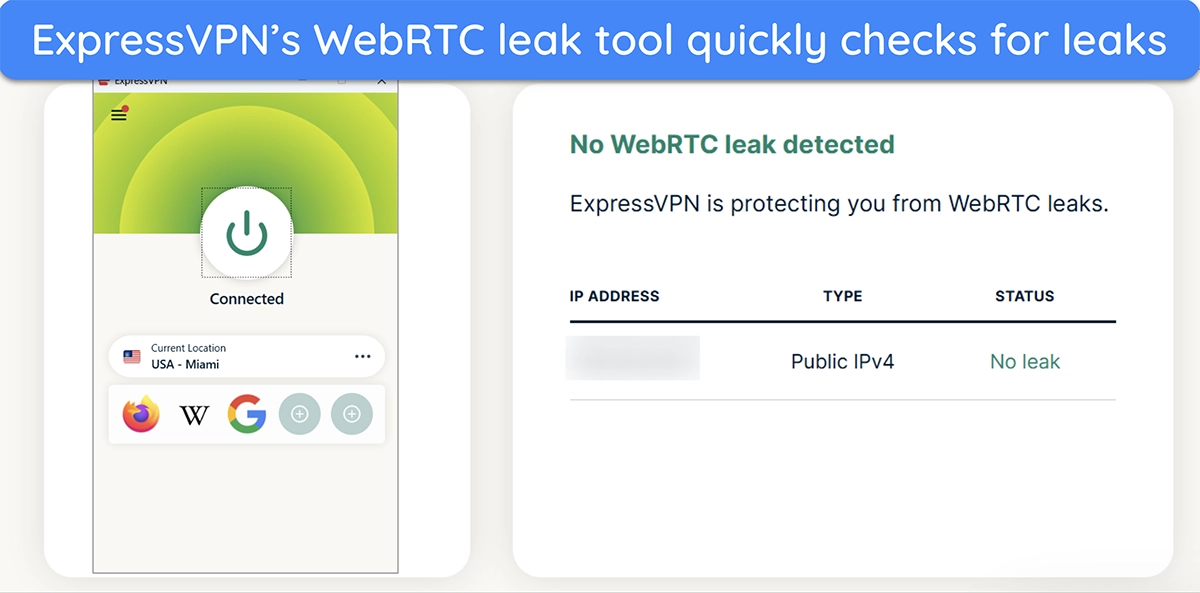Data Leak Protection: How VPNs Stop IP and DNS Leaks Online
Data leaks are when you leak sensitive information, like your IP address and DNS queries, while using the internet. Of course, data leaks are very dangerous, as they can let malicious actors know your identity and inform them about your online activity.
Thankfully, there are ways to safeguard yourself against data leaks. One of the best ways to prevent data leaks is using a VPN, but several other methods exist. In this article, I’ll explain how to protect yourself against data leaks to maintain safety and privacy while surfing the web. Editor’s Note: We value our relationship with our readers, and we strive to earn your trust through transparency and integrity. We are in the same ownership group as some of the industry-leading products reviewed on this site: ExpressVPN, Cyberghost, Private Internet Access, and Intego. However, this does not affect our review process, as we adhere to a strict testing methodology.
Quick Summary: What is Data Leak Protection
When you’re using the internet, you’re always at risk of exposing identifying information like your IP address, DNS queries, and WebRTC data. However, data leak protection in a VPN helps keep this information from leaking online, ensuring you stay completely safe and anonymous while surfing the web.
Data Leak Protection: Full Explanation and Types of Leaks
Data leak protection in a VPN ensures you stay anonymous and protected online by keeping you from leaking your IP address, WebRTC data, and DNS queries. It isn’t a specific feature you enable but rather something accomplished by the various security tools VPNs have, like their encryption, no-logging policies, and built-in kill switches.
Through these features, VPNs ensure you never expose any sensitive details online. For instance, they use their own encrypted DNS servers, keeping your DNS queries from leaking online. Plus, VPNs mask your location and can even keep browsers from leaking WebRTC data, stopping you from accidentally revealing your real IP address. There are a few different types of data leaks you could experience, including IP address, DNS, and WebRTC leaks.
IP Address Leaks
IP address leaks are when your real IP address (assigned by your ISP) gets revealed to websites or any online service. You’ll experience IP address leaks if you use your connection without a VPN and sometimes even with a VPN that doesn’t have proper security features.
DNS Leaks
DNS leaks usually occur when your device sends DNS queries directly to your ISP’s DNS servers. Since DNS requests translate website names into IP addresses, leaking this data can reveal your online behavior [1] and compromise your privacy to your ISP or anyone else spying on your traffic.
WebRTC Leaks
WebRTC leaks are when your browser’s WebRTC (Web Real-Time Communication) feature exposes your IP address. Browsers use WebRTC to establish peer-to-peer communication, which is vital for tasks like file sharing and video calling. It’s a critical feature, but the issue is that browsers can sometimes bypass VPN tunnels and expose your real IP address [2], compromising your identity even when you’re using a VPN.
How to Check for Data Leaks
It’s easy to double-check whether you’re leaking any data, as you can use various online tools to detect these leaks.
Checking for IP Address Leaks
You can easily check whether you’re leaking your IP address using our leak testing tool. If it shows your IP address type as ‘Exposed,’ it means any website or service you use online can see your real IP address. If you see this, it’s important to secure your IP address immediately to safeguard your privacy.
Checking for DNS Leaks
Using the online DNS leak test tool is among the best ways to check for DNS leaks. Simply navigate to the website, choose the ‘Extended Test’ option, and wait for it to finish the test. If you see the same server locations as your chosen VPN servers, there likely isn’t a DNS leak. If you see different servers, you’re leaking DNS information.
Checking for WebRTC Leaks
ExpressVPN has a reliable WebRTC leak test tool you can use to see if your browser is leaking WebRTC data. To check for WebRTC leaks, just open the page, and it’ll tell you whether there’s a leak. If you’re using a VPN, it’ll inform you whether it’s successfully preventing DNS leaks or if you’re still leaking data.
How to Prevent Data Leaks
Thankfully, if you’ve found that you’re leaking data, there are methods you can use to prevent sensitive data from leaking online — ensuring you stay safe and anonymous while surfing the web.
Preventing IP Address Leaks
Your IP address is basically your online identity, which is why it is critical to keep it from leaking. If your IP address is leaked online, attackers could use it to spy on your activity and may even attempt to breach your network.
There are two types of IP addresses: IPv4 and IPv6. You usually won’t experience IPv4 address leaks when connected to a reliable VPN. However, you may still leak IPv6 details, as not all VPNs support it. Thankfully, many VPNs have a feature to disable IPv6 connections as long as you’re connected to them, and this is the best way to prevent these leaks.
Another method of preventing IPv6 leaks is disabling the feature entirely on your OS. You can do this via the network settings on Windows and macOS devices. There’s no method to disable IPv6 on Android or iOS, but you can disable IPv6 traffic through your router to secure all your devices from IPv6 leaks.
Preventing DNS Leaks
Preventing DNS leaks is crucial, or anyone spying on your traffic can monitor your online activity, thus compromising your privacy. There are multiple ways to prevent DNS leaks, but first, you should ensure you’re using a private third-party DNS server.
Google DNS is a reliable option. It provides DNS over TLS and DNS over HTTPS to ensure that all your DNS queries remain private and no one can see what you do online.
Of course, using a VPN is another reliable solution for stopping DNS leaks. In my tests, I found that top VPNs like ExpressVPN use their own encrypted private DNS, meaning all your DNS queries are encrypted and can’t be seen by anyone trying to spy on your connection. This is also a convenient solution, as you don’t need to configure any DNS settings manually.
Preventing WebRTC Leaks
While a VPN may help prevent them, configuring your browser is the best way to stop WebRTC leaks. This is because they’re caused by how your browser handles P2P communications with services on the internet.
Fortunately, it’s easy to disable WebRTC on most browsers to prevent WebRTC leaks. For instance, Firefox lets you do this by accessing about:config and setting the ‘media.peerconnection.enabled’ setting to false.
We’ve also covered how to stop WebRTC leaks in other browsers. To ensure you remain protected and anonymous online, it’s recommended that you follow the steps for each of your browsers.
Do VPNs Leak Data?
While you shouldn’t expect any leaks with the top VPNs of 2025, it’s important to remember that many free VPNs, and even some paid ones, can leak your data. They either use unreliable encryption or have inconsistent kill switches, meaning your IP address or DNS queries could accidentally get leaked online.
Another issue is that free VPNs may log your activity since they don’t have no-logs policies and then sell this data to third parties. While this isn’t the same as leaking your data, it still compromises your privacy and online activity.
FAQs on Data Leak Protection
Do VPNs prevent data leaks?
Can I use a free VPN to stop data leaks?
How to avoid VPN leaks?
What is a DNS leak test?
Keep Yourself Safe and Anonymous Online With Data Leak Protection
In conclusion, data leaks are a significant security concern you must defend against. Otherwise, you risk malicious actors finding out your identity or spying on everything you do online, thus compromising your privacy.
Thankfully, you can stop data leaks using a VPN and various other security measures. As long as you follow the various solutions mentioned above, you can reliably prevent your sensitive data from leaking, thus ensuring you always stay protected and anonymous online.
References
1: https://www.fortinet.com/uk/resources/cyberglossary/dns-leak










Leave a Comment
Cancel